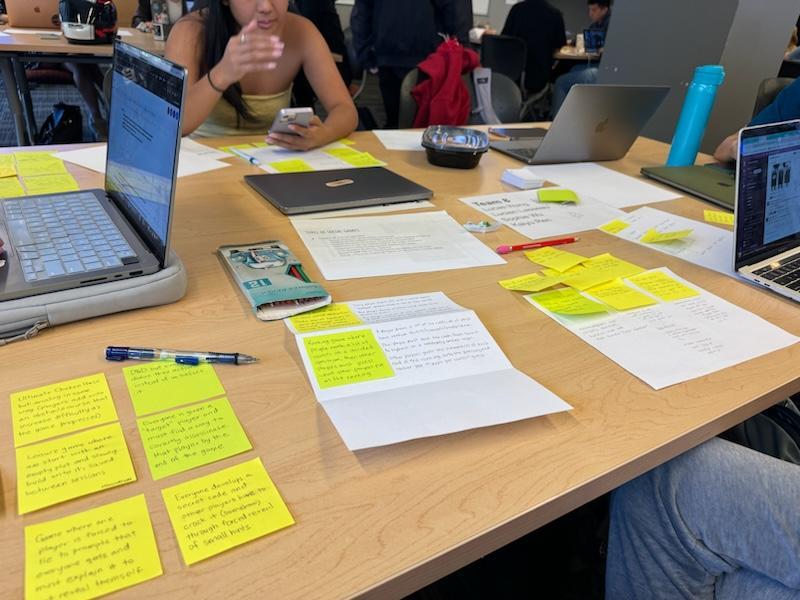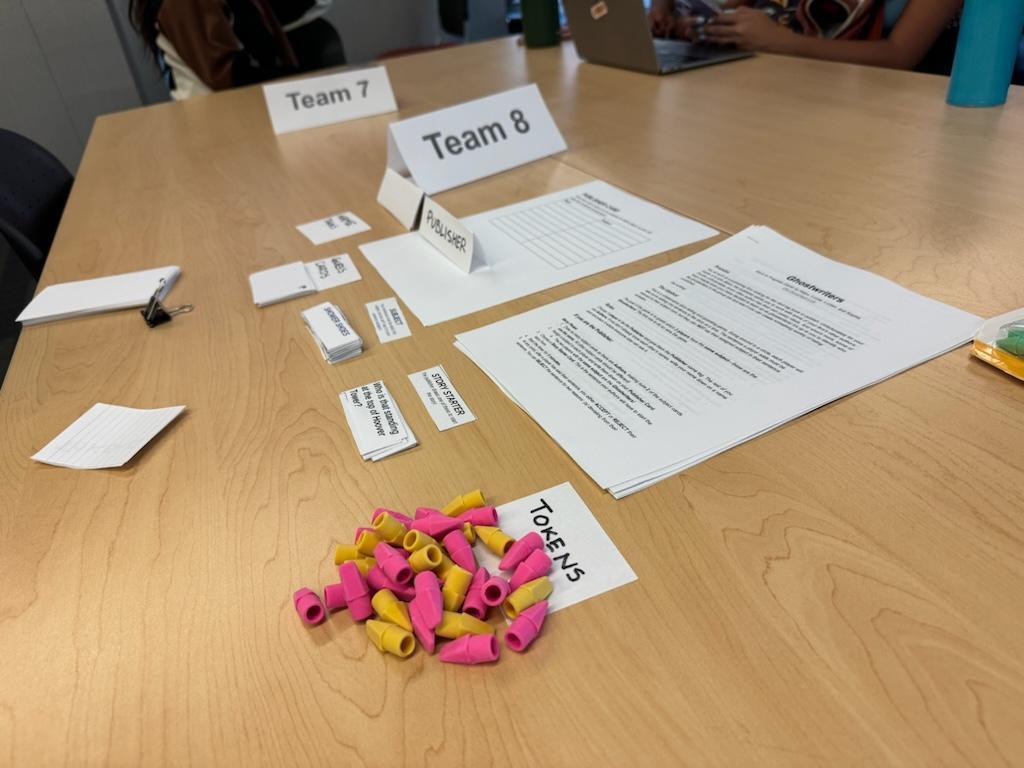Artist’s Statement
Ghostwriters is a card-based improv game which aims to encourage social engagement and creativity. It emerged from an attempt to turn the hidden role formula on its head by hiding roles from everybody, even the players who have them. Instead of competing against an opposing team, players all race to figure out who the teams even are, all while trying to create what could most generously be called a piece of art. To balance out the somewhat strange incentives that this dynamic creates, we also decided to incorporate a moderator role (the “publisher”) to keep the story on track while the rest of the players focus on insight and improvisation.
From a narrative perspective, we wanted to explore the concept of authorial inauthenticity, with the ghostwriters as “fake authors” trying to get their work passed off as legitimate. Somewhere along the line, our gameplay concept evolved to the point where every player had reason to believe that they were contributing authentically. This state of affairs could be interpreted as a statement on the nonexistence of fake art and the validity of everybody’s contributions. Though each player is trying to figure out who among them is being unoriginal, they all have to answer to the publisher in the end.
Concept Map



CONCEPT: Drive Link GAME LOOP PAPER: Drive Link GAME LOOP DIGITAL: Figjam Link
Initial decisions about formal elements and values
Ideation:
As a team, we decided to decide our idea for the P1 game by voting. Each of us offered two ideas and we discussed our basic ideas and the type of the game. After discussing and debating our ideas, we decided to converge our ideas together and create a social deduction game about identifying fakers.
We discussed the game mechanics and decided that we want to make a social deduction game. We then made a prototype of our game (shown in figure 1). It includes two decks of context and topic cards. Each of us then began creating ideas for the cards and we contributed to the ideas.
After playtesting our prototypes, our team realized that the mechanics of the game is not optimal. After a lot of discussion, we decided to add the role of a dealer (later named “Publisher”) so that the game will run more smoothly.
Finalized Formal elements:
Players- The game needs one moderator “Publisher” and at least four “Authors”. Two of the “Authors” who receive the same subject cards will be “Ghostwriters”
Resources- After getting rid of the “Wild Cards”, each player will receive a token if the “publisher” accept their sentence
Moderator- We will elect one player to be the “publisher” for each round. We can have the option to change the “publisher” each round so each of the players get a chance to moderate the game.
Objective/Outcomes- The objective of the game is to create the most coherent and interesting story while hiding their identities during the game.
Testing and Iteration History
April 9th
Our initial concept was a collective storytelling social deduction game. Only the very core concepts of players being assigned topics, trying to drive a story in that direction, and trying to guess each other’s topics were present in this early concept. At this point we hadn’t even built a prototype, and we were still hashing out how we wanted the core gameplay to function.

April 11th
After making our initial prototype, we played the game amongst ourselves and made sure it was playable. We realized that we were dealing with a minimum player count, and that we needed some sort of dealer (later the publisher role) to manage card distribution.
April 16th
For our first official playtest we had implemented a wild card feature to try to improve gameplay diversity, but players found it confusing and unengaging. We removed it immediately after this playtest. More importantly, we found that the story that players were telling wasn’t really sticking to a consistent narrative, but rather ended up pivoting wildly as players tried to incorporate their own topics. On the suggestion of our playtesters, we decided to incorporate some kind of “call bs” mechanic to punish players for failing to build a coherent narrative as they played.
April 18th
In this round of playtesting we implemented the “publisher” role to handle keeping the story on track. Players responded well to that, but at this point they found the game far too easy. Most of our feedback from this round centered around requests and suggestions for the objectives to be improved.
April 23rd
This round of playtesting resulted in pretty minimal feedback. There were minor complaints about the length of the rules and the pacing of the scoring system, so we resolved to fix both of those in the final deliverable.


Final prototype
Ghostwriters
Improvisation-based card game by Kaiyu, Lucas, Lucien, and Sophie
Premise
You all work at a publishing firm looking for the next big book to publish. You have hopes of a solo debut, but unfortunately the publisher wants you to work with some of your firm’s other authors. Double unfortunately, every other author has their own pesky ideas. And what’s more, two of the authors are working on the same idea as ghostwriters, but nobody’s quite sure who! It’s up to you to identify who the ghostwriters in the group are and see if you can create something worthy of being published.
Get writing!
Summary
This is a collaborative story-telling and guessing game. Going around in a circle, each player will take turns adding one sentence to the story at a time. The sentence a player adds must be relevant to their subject card, but they can NOT say their assigned subject in their sentence verbatim.
The goal of the game is to guess which 2 players have the same subject—these are the Ghostwriters! The first one to do so wins the game.
Setup
- Choose 1 player to be the Publisher. The rest of you are Authors.
- The publisher draws as many subject cards as there are Authors, making sure 2 of the subject cards are the same. All other subject cards should be different!
- The publisher deals a subject to each player and writes them down on their Publisher Card.
- The two players with the same subject are the Ghostwriters!
- The publisher chooses a Story Starter Card. This is the sentence that the authors will have to start the story from.
- The publisher sets a timer for 5 minutes.
Gameplay
Story Phase (5 minutes)
- Players take turns saying a sentence that adds onto the story and is relevant to their subject.
- Players must NOT say their subject in their sentence verbatim.
- After each player’s turn, the publisher may either accept or reject that player’s sentence.
- If the sentence is accepted, the publisher gives the player a token which can be spent during the Guessing Phase, and their sentence is added to the story.
- If the sentence is rejected, the player does not receive a token, and their sentence is NOT added to the story. The player after them continues from the most recent accepted sentence.
- After all authors have contributed a sentence, or the timer has gone off, transition to the Discussion Phase.
- The publisher should set a timer for 2 minutes.
Discussion Phase (2 minutes)
- Authors debate about who they believe the two ghostwriters to be.
- Anybody can defend themselves.
- However, authors are still FORBIDDEN from uttering their subject.
- After the two minutes are up, transition to the Guessing Phase.
Guessing Phase
- Authors can choose to spend at least 2 tokens to make a guess.
- To do this, they must write the names of the 2 authors they believe to be the ghostwriters on a card, and give it to the publisher without letting anybody else see their guess.
- If they guess correctly, they win the game!
- If they guess incorrectly, they lose their 2 tokens, and guessing continues.
- To do this, they must write the names of the 2 authors they believe to be the ghostwriters on a card, and give it to the publisher without letting anybody else see their guess.
- The first player to make a correct guess wins, ending the game.
- If there are no correct guesses, transition to the Story Phase and continue extending the story.
Materials Needed
- A set of subject cards with topics/nouns on them
- A set of context cards with different story-starters (contexts) on them
- Tokens for the publisher to distribute to the players after correct guesses
- A publisher card for the publisher to keep track of players
- A pen for the publisher or players to write with
- Blank cards or notes for players to write their guesses onto
Final Playtest
ghostwriters_final_playtest.MOV
Print-n-play Version
Design mockups





BOX: Canva Link LOGO: Canva Link


